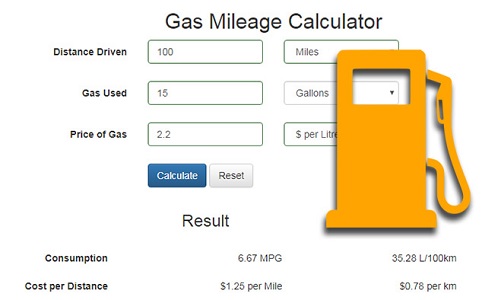Are you curious about how to calculate your car’s gas mileage? Do you want to know how to optimize your fuel consumption and improve your vehicle’s efficiency? In this article, we will delve into the world of calculating gas mileage, exploring various methods, and providing practical tips to help you make the most out of every gallon. Whether you own an older car with a trip computer or a newer vehicle with a real-time MPG display, this guide is packed with valuable insights. So let’s dive in and unlock the secrets of calculating and maximizing your MPG!
1. How Does MPG Work?

Before diving into the calculations, let’s understand the basic concept of miles per gallon (MPG). MPG is a measure of how efficiently your car consumes fuel by determining the number of miles it can travel on a gallon of gas. It serves as an essential metric to evaluate a vehicle’s fuel economy and compare different models.
2. Why Calculate Your Gas Mileage?
Knowing your car’s gas mileage can provide several benefits. Firstly, it helps you monitor your fuel consumption and budget accordingly. By understanding how far you can travel on a gallon of gas, you can plan your trips and calculate the amount of fuel needed. Secondly, calculating gas mileage allows you to evaluate your vehicle’s efficiency and identify any potential issues that might be affecting it. Moreover, tracking your MPG enables you to make adjustments to your driving habits and implement strategies to improve fuel efficiency.
3. How to Calculate MPG with a Trip Computer
If your car is equipped with a trip computer, calculating MPG becomes a straightforward process. The trip computer provides you with the necessary data, including the number of miles driven and the amount of fuel consumed. By dividing the number of miles by the gallons of gas used, you can easily obtain your car’s MPG. This method eliminates the need for manual calculations and offers accurate and real-time information.
4. Calculating Gas Mileage Without a Trip Computer
For older vehicles without a trip computer, determining your gas mileage requires a few additional steps. Here’s a simple method you can follow:
- Fill your gas tank completely and reset your trip odometer.
- Drive your car as you normally would, making note of the number of miles you’ve driven.
- When it’s time to refill your tank, write down how many gallons it took to refill it.
- Divide the number of miles you drove by the gallons of gas you refilled to get your MPG.
5. Factors That Affect Your MPG
While calculating your MPG is essential, it’s crucial to understand the factors that can influence your fuel efficiency. Here are some key aspects to consider:
- Driving Habits: Aggressive driving, rapid acceleration, and excessive idling can significantly decrease your MPG.
- Vehicle Maintenance: Regular tune-ups, proper tire inflation, and clean air filters contribute to better mileage.
- Driving Conditions: Stop-and-go traffic, hilly terrain, and extreme temperatures can affect your MPG.
- Vehicle Speed: Higher speeds usually result in lower fuel efficiency, so try to maintain a consistent pace.
- Fuel Quality: The quality of the fuel you use can impact your MPG, so opt for reputable gas stations.
- Vehicle Load: Carrying excess weight in your vehicle can decrease fuel efficiency, so keep it light when possible.
6. Tips for Improving Your Fuel Efficiency
Now that you have a good grasp of calculating your gas mileage, let’s explore some practical tips to boost your fuel efficiency:
- Maintain steady speeds: Avoid unnecessary acceleration and deceleration to minimize fuel consumption.
- Proper tire inflation: Keep your tires properly inflated to reduce rolling resistance and improve MPG.
- Avoid excessive idling: If you’re going to be stationary for more than a minute, turn off the engine.
- Combine trips: Consolidate multiple errands into one trip to reduce unnecessary mileage.
- Remove excess weight: Clear out any unnecessary items from your vehicle to improve fuel economy.
- Use cruise control: Engaging cruise control on the highway can help maintain a consistent speed.
- Plan routes efficiently: Choose the most direct and traffic-free routes to save time and fuel.
- Avoid roof racks: Remove roof racks or cargo carriers when not in use to minimize wind resistance.
- Consider carpooling: Sharing rides with others can significantly reduce fuel consumption.
7. Understanding Instant MPG and MPG Display
Some newer vehicles offer advanced features like instant MPG and MPG displays. Instant MPG provides real-time information about your car’s fuel consumption, enabling you to adjust your driving habits for optimal efficiency. The MPG display, on the other hand, shows the average fuel consumption over a specific period. Understanding and utilizing these features can help you gauge the immediate impact of your driving choices and track your overall fuel efficiency.
Most Recommended: Health Screening for NYC DOE Schools: A Comprehensive Guide
8. The Importance of Accurate MPG Readouts
Having accurate MPG readouts is crucial for effectively managing your fuel consumption. If your car’s MPG readout is inaccurate or inconsistent, it can lead to incorrect calculations and affect your budgeting. Consider calibrating or verifying the accuracy of your MPG readout periodically to ensure reliable data.
9. Utilizing Real-Time MPG Displays Effectively
Real-time MPG displays provide valuable information about your car’s fuel efficiency as you drive. To make the most of this feature, pay attention to how different driving behaviors affect your MPG. Experiment with adjustments to your speed, acceleration, and braking, and observe the immediate impact on your fuel consumption. This knowledge will empower you to make informed choices that maximize your MPG.
10. Other Methods to Calculate Gas Mileage
In addition to the methods mentioned earlier, there are other ways to calculate your gas mileage. Online fuel consumption calculators, mobile apps, and even manual calculations using specific formulas can provide accurate results. Explore different options and choose the method that suits your preferences and the information available to you.
Visit: Buffalo Bounce House Rental’s Customizable Themed Bounce Houses
Summary
To summarize, calculating your gas mileage is a valuable practice that allows you to monitor and optimize your fuel consumption. Whether you have a trip computer with an MPG readout or need to perform manual calculations, understanding your car’s MPG empowers you to make informed decisions about your driving habits and identify areas for improvement. By implementing the tips mentioned in this article and paying attention to factors that affect your MPG, you can enhance your vehicle’s fuel efficiency and save money at the pump.
Remember these key points:
- Calculate your MPG using a trip computer or manual methods.
- Factors like driving habits and vehicle maintenance influence your fuel efficiency.
- Tips for improving fuel efficiency include steady speeds, proper tire inflation, and route planning.
- Instant MPG and MPG displays provide real-time and average fuel consumption information.
- Accuracy in MPG readouts is essential for effective fuel management.
- Explore various methods to calculate your gas mileage and choose the one that suits you best.
With this knowledge, you’re equipped to take control of your vehicle’s fuel consumption and drive more efficiently. So go ahead, calculate your gas mileage, and start saving on your fuel expenses today!



